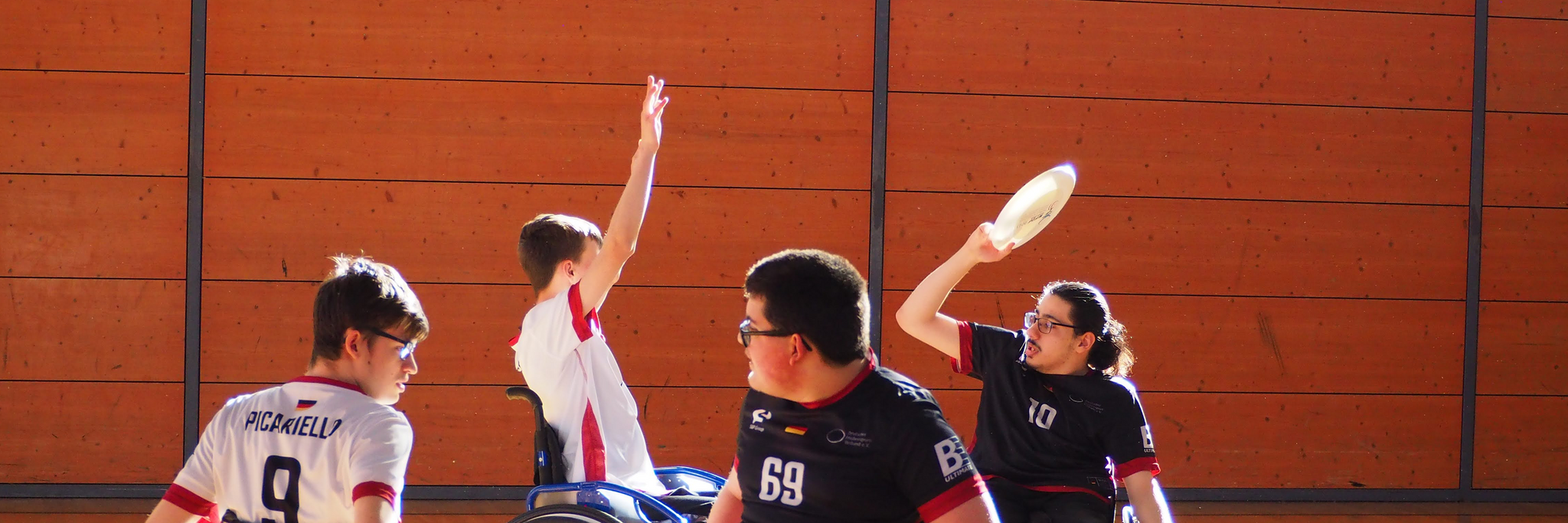Wheelchair Ultimate & Traditional Ultimate: 10 Rule Differences You Should Know

Wheelchair Ultimate and Traditional Ultimate share the same spirit of the game — fast-paced disc movement, teamwork, and self-officiating — but a few key rules set them apart. Here’s a quick breakdown of the top 10 rules you need to know:

1. The Field
Wheelchair: Played indoors on a gym court, usually 25–30m × 13–17m, with 5–6m end zones.
Traditional: Outdoor field, 70m × 40m, with 20m end zones.
2. Starting Play
Wheelchair: Four players per team; each point begins with a pull (throw-off) from the defense.
Traditional: Seven players per team; play starts the same way, with a pull.
3. Scoring
Wheelchair: A point is scored when the offense completes a pass in the defense’s end zone; the scoring team restarts.
Traditional: Same rule — complete a pass in the end zone to score, then switch direction and restart.
4. Movement & Possession
Wheelchair: Players are only allowed to move on the pivot that is directly under the center of the wheelchair.
Traditional: Players cannot move with the disc; they must pivot on one foot. Stall count is 7 seconds.
5. Change of Possession
Both: Turnovers happen when a pass is dropped, blocked, intercepted, or goes out of bounds.
6. Substitutions
Wheelchair: Substitutions are more frequent, often after a point or when players need rest.
Traditional: Subs occur after a point or during an injury timeout.
7. Contact & Safety
Wheelchair: Any wheelchair contact that affects play is a foul; chairs are treated as part of the player. Safety is strict.
Traditional: Physical contact is also a foul, though light incidental contact is sometimes tolerated.
8. Fouls
Wheelchair: Contact or unsafe play stops the game but minor unintentional contact is not considered a foul.
Traditional: Fouls are called by players themselves; if contested, the play is redone.
9. Self-Officiating & Spirit of the Game
Both: Players call their own infractions and resolve disputes. Spirit of the Game is central — fairness, respect, and joy of play.
10. Game Duration
Wheelchair: Games are usually timed halves, shorter to manage stamina.
Traditional: Games end at a set point total (often 15) or after a time cap in tournaments.
Spirit of the Game (SOTG)
The Spirit of the Game is the foundation of Ultimate, in both Wheelchair and Regular play. It emphasizes that highly competitive play is welcome — but never at the expense of respect, safety, or the joy of play.
Key points:
Self-Officiating: Players are responsible for calling fouls, resolving disputes quickly, and making fair, consistent decisions.
Mutual Respect: Avoid dangerous play, taunting, or aggressive behavior. Communicate respectfully and acknowledge cultural differences.
Good Spirit in Action: Examples include retracting a call if it was wrong, checking in with opponents after a contentious play, complimenting good play, introducing yourself, and staying calm under provocation.
Team Responsibility: Teams are guardians of Spirit, tasked with teaching, modeling, and reinforcing it. Experienced players guide novices, and all players are expected to uphold fairness and safety.
Handling Disputes: If a play is unclear or contested, players return the disc to the last non-disputed thrower. The goal is always to simulate what would have happened had there been no infraction.
Spirit of the Game ensures that Ultimate is fair, safe, and fun for everyone, whether on wheels or on foot.




